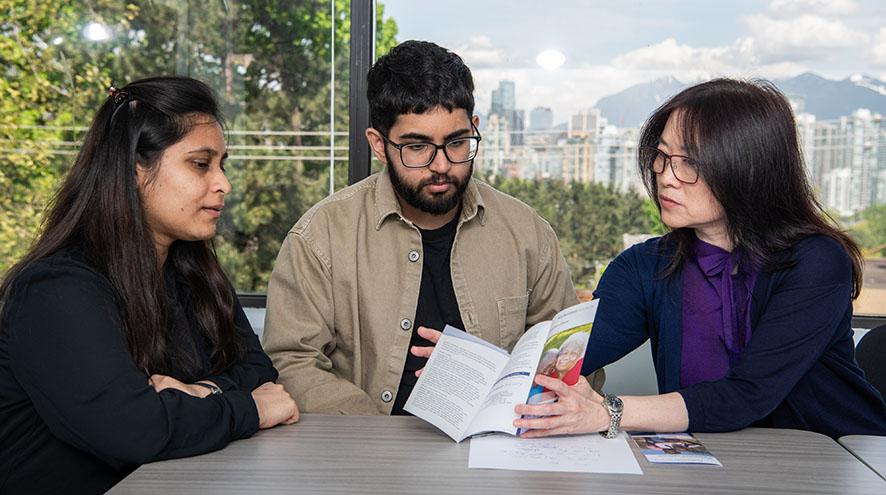Accessing home support and care services in B.C.
Navigating health-care systems and looking for support services to help with daily tasks can be overwhelming. Learn more about community supports – including home health-care, respite and adult day programs – and how to access them.

If you are living with Alzheimer’s disease or another dementia, you and your care partner might need help with daily activities. Understanding how to access home support and care services in B.C. will help you to be prepared.
This page offers information to begin the discussion between a person living with dementia and their caregivers, as well as an overview of the different types of services available – including both public and private options in addition to the support services provided by the Alzheimer Society of B.C.
Public and government services
Accessing home and community care services in B.C.
Home and community care services are public health-care and support services that are generally designed to help people stay in their homes as long as possible.
Types of home and community care services
Publicly subsidized services include:
- Adult day programs: Provides recreational activities to engage people living with dementia. Some programs may include meals and transportation.
- Respite care: Provides caregivers a break when the person living with dementia stays at a care home temporarily. A person eligible for the service can take up to 30 days of respite care per year.
- Home support: Assists with daily activities including bathing and dressing.
- Home care: Provides short-term services that can include both nursing support like wound care and medication management as well as community rehabilitation services to help improve or maintain physical and functional abilities and to ensure a home is safe.
Learn more about the Government of B.C.’s home and community care services (Enter “home and community care” in the search bar).
Watch a video on accessing support services for an overview of both public and private health services available in B.C.:
Connecting with home and community care services
Anyone can contact home and community care services – the person who lives with dementia, their family member, friends or health-care professionals.
To qualify for these types of services, a person must be a Canadian citizen or have a permanent resident status, be a resident of B.C. for at least three months and be 19 years of age and older. The person must also have difficulty functioning independently because of health-related issues.
There may be exceptions or an extensive assessment may be required, so we recommend contacting your local health authority to find out the details and review the criteria.
These home and community care services (or home care services) are provided by regional health authorities in B.C., as well as the First Nations Health Authority. The services offered may vary across regions depending on where you live:
- Fraser Health Authority
- Interior Health Authority
- Island Health Authority
- Northern Health Authority
- Vancouver Coastal Health Authority
- First Nations Health Authority
Services including home support, adult day programs and respite care will have daily charges depending on the income level. Note that the fees and rates may change, so check with the health authority for the latest information.
The Government of B.C. provides a full list of requirements, exceptions to these requirements, as well as additional needs assessment criteria for specific services. (Enter “are you eligible” or “eligibility criteria” in the search bar). We recommend calling the First Link® Dementia Helpline to go through the assessment process in more detail before you connect with government services, so you are more prepared for the conversation.
Working with a case manager
Once you qualify for home and community care services, a case manager from the health authority will be assigned to support you and your family throughout the process.
The case manager will first assess what you need – via a phone and/or in-home visit – and inform you about the services that are right for you and any costs involved.
Note: The term “case manager” may vary by community.
In general, a case manager acts as a coordinator of services. Some tasks include:
- Making phone calls and home visits to assess a person’s health-care needs and eligibility for services.
- Working with family members or caregivers to develop a care plan, arrange services, and inform them of any services that the person might need in the future.
- Keeping track of the changes the person living with dementia is experiencing.
- A case manager will also support families with the process of applying for an admission to publicly-subsidized long-term care.
To get ready for your initial assessment with the case manager, the person receiving the services needs to prepare documents, for example, B.C. Care Card. or B.C. Services Card, a list of prescription medications and income tax notice of assessment.
The Alzheimer Society of B.C. works independently from the health authority's Home and Community Care. Our role is to offer information and education on aspects of long-term care in B.C., such as preparing for a move into care and adjusting after a move. We also answer questions about home support and suggest strategies to help you prepare for your initial meeting with a case manager and ongoing strategies for working well together. For more information, call the First Link® Dementia Helpline to learn more about education and resources in your community.
Watch our recorded videos on long-term care.
Visit the Government of B.C. for more information (enter “long-term care” in the search bar.)
Communicating with your case manager
Working with a case manager can be a long process and good communication is key to getting the support and care you need most. In some cases, you might not qualify for certain home and community care support services , so your case manager will discuss which services you are eligible for. Our self-advocacy strategies web page has a variety of useful resources, including tips on accessing home support and advocacy resources.
Home and community care policy manual
Published by the Government of British Columbia, the home and community care policy manual contains Information including eligibility for services, how to access and the process for determining the costs and rates.
Better At Home
United Way’s Better At Home program offers low or no-cost support services available across the province to help older adults with simple, non-medical home support services – such as light housekeeping, transportation and friendly visiting – so that they can stay in at their homes. Better at Home services vary from community to community – connect with Better At Home in your community by calling 211.
Private home support and care services in B.C.
Private health-care services require you to pay for them – you do not need to qualify. Hiring support workers from these services can help with day-to-day tasks, such as cooking and other chores, to fill gaps and provide services that home and community care may not.
Route 65
Route 65 is a free, online directory that helps seniors find independent living, assisted living, long-term care, home care and home support services across the province.
Many local communities have seniors directories that advertise or publish lists of private home care services. You can find a list of community resources through your local community or seniors centre. We also offer lists of community resources relevant to people affected by dementia. To discuss what resources may be available to you or to connect with an Alzheimer Society of B.C. resource centre in your community, call the First Link® Dementia Helpline.
First Link® dementia support
Family members, friends and neighbours are all part of the vital support network for people impacted by dementia. The Alzheimer Society of B.C. is also part of that support network. We are committed to ensuring that people affected by dementia have the confidence and skills to live the best life possible. The Alzheimer Society of B.C.’s First Link® dementia support offers a range of programs and services designed to help:
- Individual support
- Dementia education, including workshops and webinars
- Support groups for people living with dementia and caregivers
- Coffee and Chat
- Minds in Motion®
- Other resources
- First Link® Dementia Helpline

Navigating through health-care and formal support systems can be complex, but we are here to help. The First Link® Dementia Helpline is a useful resource for discussing the challenges that can arise during the process.
- English: 1-800-936-6033 (Monday to Friday, 9 a.m. to 8 p.m.)
- Cantonese and Mandarin: 1-833-674-5007 (Monday to Friday, 9 a.m. to 4 p.m.)
- Punjabi, Hindi and Urdu: 1-833-674-5003 (Monday to Friday, 9 a.m. to 4 p.m.)
Helpful resources about home support and care services
- Accessing services webinar playlist, presented by the Alzheimer Society of B.C.
- Long-term care resources, from the Alzheimer Society of Canada
- Health authorities in B.C.:
- First Nations Health Authority
- Government of B.C.’s BC Senior’s Guide
- Government of B.C.’s home and community care policy manual
- Government of B.C.’s home and community care services
- Better At Home (United Way British Columbia Healthy Aging)
- Route 65 online directory
